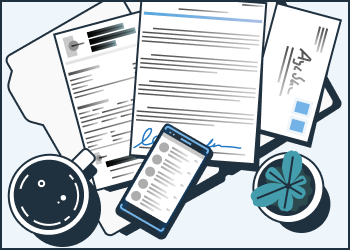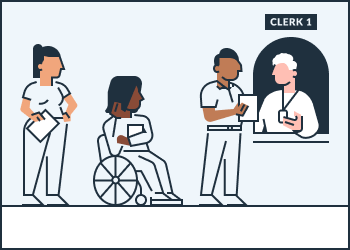Fee waivers in guardianships and conservatorships
When you file papers to start a guardianship or conservatorship case, you pay a filing fee. There are also fees for an investigation and certified copies of court forms. There may be other fees later in your case.
You can ask the court for a “fee waiver” so you do not pay these fees. When you ask for the fee waiver, the court will look at the income and ability to pay of the child (in a guardianship) or the proposed conservatee (in a conservatorship). If the court gives you a fee waiver, you do not have to pay the filing fee, costs of the investigation, and other fees.
When to ask for a fee waiver
Typically, you ask for a fee waiver when you file papers to start a guardianship or conservatorship case and have to pay your first filing fee. There is no fee if you are the child's or conservatee's parent filing papers to say you disagree with (oppose) the guardianship or conservatorship, or if you're doing so on behalf of the proposed ward (the child) or proposed conservatee. There may be other fees for other filings or for relatives who want to oppose the request.
Guardians or conservators: You can ask for a fee waiver if you're asking the court to appoint a guardian or a conservator for a child or an adult. You can also ask for a fee waiver if you're already the guardian or conservator and the child or conservatee can't afford fees later in the case. The fee waiver in these situations are based on the child's or the ward's income, not yours. Fee waivers expire 60 days after the case is finished (judgment entered, dismissal, or final decision by the judge). They can also end if the court finds the child or conservatee no longer qualifies for the fee waiver.
Parent or other relative: Keep in mind that if you're a parent or other relative filing papers in a guardianship or conservatorship case and you can't afford to pay the filing fees, the judge will decide whether to wave your filing fees based on your income. You will also need to ask the court for a fee waiver on different forms because you're a parent or relative in a guardianship or conservatorship case. Click here to to ask the court for a fee waiver if you're a parent or other relative filing papers in a guardianship or conservatorship case.
If you're the petitioner in a guardianship or conservatorship case, you qualify for a fee waiver if the child or conservatee:
-
Receives public benefits.
For example, if they receive unemployment, Medi-Cal, Food Stamps (Cal Fresh/SNAP), WIC, Cal-WORKS, General Assistance, SSI, SSP, Tribal TANF, IHSS, or CAPI. You also qualify if the child's parent or conservatee's spouse receives one of these benefits. You will need to list which benefit they receive and who receives the benefit to qualify.
-
Has a household income, before taxes, below a set amount.
The set amount is listed on Form FW-001-GC in item 8b. The amount depends on the number of people in the household. You will need to give the court information about household size and income. Do not include any proposed guardian or conservator in the household size and do not count their income (unless they are the spouse of the proposed conservatee).
-
Can't meet their household's basic needs and pay the filing fees.
You will need to give the court information about their income and expenses to qualify this way. Do not include the income and expenses of the proposed guardian or conservator (unless they are the spouse of the proposed conservatee).
How to ask for a fee waiver
-
Gather the information you need

You may need information about the child's or conservatee's income and expenses to fill out the fee waiver form.
If they receive public benefits, you only need to check which benefit they receive on the form. You don't need to fill out the part about their income or expenses.
If their household income is below a set amount, you will need to fill out information about their household income. You might need to look at copies of paystubs or other documents with their income, to fill out the forms.
If they can't afford the fee and their household's basic needs, you will need to fill out information about their income and expenses. You might need to look at things like paystubs, bills, and bank statements, to fill out the forms.
-
Fill out forms
Fill out the Request to Waive Court Fees (Ward or Conservatee) (form FW-001-GC). This is a confidential form that only the court will see.
On item 8, check a, b, or c depending on why they qualify.
- If you checked a (they qualify because they receive public benefits), you do not need to complete Page 4.
- If you checked b (they qualify because of their household income), you must answer the items on Page 4 about their household income (items 14, 15, and 16).
- If you checked c (they qualify because they can't afford the fee), you must fill out all of Page 4.
Sign your request for a fee waiver under penalty of perjury. This means you promise the court that you are telling the truth and that you understand you can be punished for lying.
Also, fill out items 1 and 3 on Form FW-003-GC, Order on Court Fee Waiver (Ward or Conservatee).
-
Make copies
Make a copy of your completed Form FW-001-GC. You'll have 2 total, including the original. You don't need to copy Form FW-003-GC.
-
File your Request for Fee Waiver

Take your original and copy of your fee waiver forms to the court clerk. You can do this at the same time you file your other court papers.
The clerk will tell you how long it will take to process your request for fee waiver. The clerk or judge will use the Form FW-003-GC to write their decision.
Yes, you can file by mail. Mail the originals and to the clerk. You need to include a self-addressed stamped envelope so the clerk can mail your copies back to you. Make sure to include enough postage. If you do not include a self-addressed stamped envelope, you will have to go to the courthouse to pick up your copies.
Some courts allow online filing (called e-filing). You can find out if your court has online filing by visiting your court’s website.
After you ask for the fee waiver
If the court granted your request
Your court papers are now fully filed. Your next step will likely be to serve the papers.
-
Go back to your steps
Return to the step by step instructions for your case
-
Go back to Home
Start again at the Self Help Guide to the California Courts
If the court didn't grant your request
Depending on why the request was denied, you may still have options to show the court more information if you act quickly. You can also decide to pay the fees yourself.
-
If the fee waiver wasn't granted
Find out how to read the court order, what to do next, and what happens if you pay the fees yourself.

